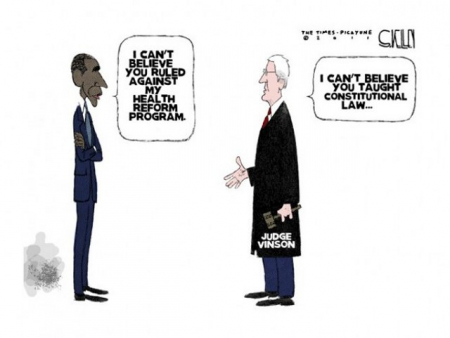 The US government is broken down into three separate branches, respectively the Legislative, Executive, and Judicial branches. Each have separate duties and mandates in order to provide for checks and balances to the power of the other branches. By this means it was envisioned by our Founders that America could stay the creep of tyranny and maintain our Constitutional liberties.
The US government is broken down into three separate branches, respectively the Legislative, Executive, and Judicial branches. Each have separate duties and mandates in order to provide for checks and balances to the power of the other branches. By this means it was envisioned by our Founders that America could stay the creep of tyranny and maintain our Constitutional liberties.
Ironically freedom requires restraint.
Nowhere in America’s government are the restraints upon the proper roles and activities by members of that branch of government stricter than within the Judicial branch. Nor is there any other branch where more restraint is needed, for neither of the other two branches of America’s government can do the lasting harm that our Courts and their rulings and opinions can cause.
It is therefor cause for hope and joy when it’s proven that a judge, especially US Federal Judge, understands the Court’s proper role. Judge Roger Vinson, senior federal judge of the United States District Court for the Northern District of Florida, is one who understands this.
An excerpt from Senior United States District Judge, Roger Vinson ruling on the Obama Regime’s attempt to dismiss Florida v. US Dept. of Health and Human Services:
For purposes of this case, it matters not whether the Act is wise or unwise, or whether it will positively or negatively impact healthcare and the economy. Nor (except to the limited extent noted in Part III.A(7) infra) am I concerned with the manner in which it was passed into law. My review of the statute is not to question or second guess the wisdom, motives, or methods of Congress. I am only charged with deciding if the Act is Constitutional. If it is, the legislation must be upheld — even if it is a bad law. United States v. Butler, 297 U.S. 1, 79, 56 S. Ct. 312, 80 L. Ed. 477 (1936) (“For the removal of unwise laws from the statute books appeal lies, not to the courts, but to the ballot and to the processes of democratic government”) (Stone, J., dissenting). Conversely, if it is unconstitutional, the legislation must be struck down — even if it is a good law. Bailey v. Drexel Furniture Co. (Child Labor Tax Case), 259 U.S. 20, 37, 42 S. Ct. 449, 66 L. Ed. 817 (1922) (reviewing court must strike down unconstitutional law even though that law is “designed to promote the highest good. The good sought in unconstitutional legislation is an insidious feature, because it leads citizens and legislators of good purpose to promote it, without thought of the serious breach it will make in the ark of our covenant, or the harm which will come from breaking down recognized standards.”).
— Judge Roger Vinson
Florida v. US Dept. of Health and Human Services, pp 2-3
That is a perfect example of a judge constraining himself to only the proper role set forth for his position and limiting himself to exercise only that authority that is rightfully his to exercise. It is not the place of any judge to engage in judicial activism and thereby violate the Separation of Powers. It’s obvious that Judge Vinson knows this.
Read the rest of this entry »
Like this:
Like Loading...
Tags: America | Courts | Federal Courts | Freedom | Judicial Activism | Law | Politics | Separation of Powers | The Constitution | Tyranny | Vinson
This entry was posted on Sunday, October 24th, 2010 at 11:36 am and is filed under Politics.
You can skip to the end and leave a response. Pinging is currently not allowed.

 As has become almost
As has become almost 
